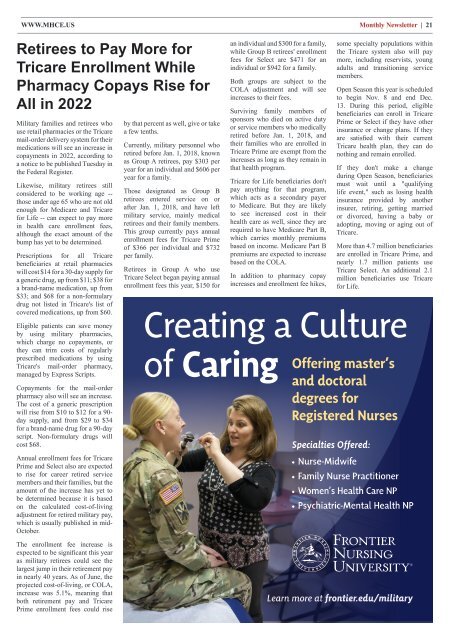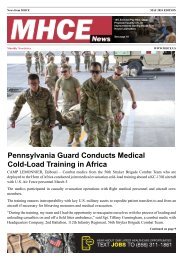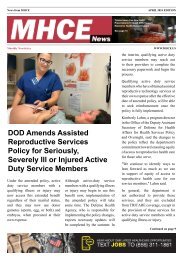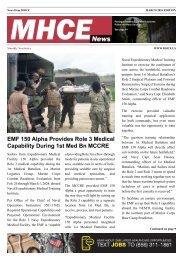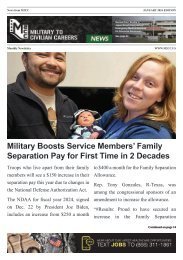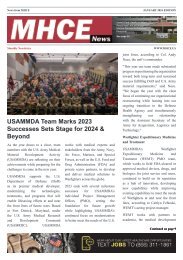Create successful ePaper yourself
Turn your PDF publications into a flip-book with our unique Google optimized e-Paper software.
WWW.MHCE.US Monthly Newsletter | 21<br />
Retirees to Pay More for<br />
Tricare Enrollment While<br />
Pharmacy Copays Rise for<br />
All in 2022<br />
Military families and retirees who<br />
use retail pharmacies or the Tricare<br />
mail-order delivery system for their<br />
medications will see an increase in<br />
copayments in 2022, according to<br />
a notice to be published Tuesday in<br />
the Federal Register.<br />
Likewise, military retirees still<br />
considered to be working age --<br />
those under age 65 who are not old<br />
enough for Medicare and Tricare<br />
for Life -- can expect to pay more<br />
in health care enrollment fees,<br />
although the exact amount of the<br />
bump has yet to be determined.<br />
Prescriptions for all Tricare<br />
beneficiaries at retail pharmacies<br />
will cost $14 for a 30-day supply for<br />
a generic drug, up from $11; $38 for<br />
a brand-name medication, up from<br />
$33; and $68 for a non-formulary<br />
drug not listed in Tricare's list of<br />
covered medications, up from $60.<br />
Eligible patients can save money<br />
by using military pharmacies,<br />
which charge no copayments, or<br />
they can trim costs of regularly<br />
prescribed medications by using<br />
Tricare's mail-order pharmacy,<br />
managed by Express Scripts.<br />
Copayments for the mail-order<br />
pharmacy also will see an increase.<br />
The cost of a generic prescription<br />
will rise from $10 to $12 for a 90-<br />
day supply, and from $29 to $34<br />
for a brand-name drug for a 90-day<br />
script. Non-formulary drugs will<br />
cost $68.<br />
Annual enrollment fees for Tricare<br />
Prime and Select also are expected<br />
to rise for career retired service<br />
members and their families, but the<br />
amount of the increase has yet to<br />
be determined because it is based<br />
on the calculated cost-of-living<br />
adjustment for retired military pay,<br />
which is usually published in mid-<br />
<strong>October</strong>.<br />
by that percent as well, give or take<br />
a few tenths.<br />
Currently, military personnel who<br />
retired before Jan. 1, 2018, known<br />
as Group A retirees, pay $303 per<br />
year for an individual and $606 per<br />
year for a family.<br />
Those designated as Group B<br />
retirees entered service on or<br />
after Jan. 1, 2018, and have left<br />
military service, mainly medical<br />
retirees and their family members.<br />
This group currently pays annual<br />
enrollment fees for Tricare Prime<br />
of $366 per individual and $732<br />
per family.<br />
Retirees in Group A who use<br />
Tricare Select began paying annual<br />
enrollment fees this year, $150 for<br />
an individual and $300 for a family,<br />
while Group B retirees' enrollment<br />
fees for Select are $471 for an<br />
individual or $942 for a family.<br />
Both groups are subject to the<br />
COLA adjustment and will see<br />
increases to their fees.<br />
Surviving family members of<br />
sponsors who died on active duty<br />
or service members who medically<br />
retired before Jan. 1, 2018, and<br />
their families who are enrolled in<br />
Tricare Prime are exempt from the<br />
increases as long as they remain in<br />
that health program.<br />
Tricare for Life beneficiaries don't<br />
pay anything for that program,<br />
which acts as a secondary payer<br />
to Medicare. But they are likely<br />
to see increased cost in their<br />
health care as well, since they are<br />
required to have Medicare Part B,<br />
which carries monthly premiums<br />
based on income. Medicare Part B<br />
premiums are expected to increase<br />
based on the COLA.<br />
In addition to pharmacy copay<br />
increases and enrollment fee hikes,<br />
some specialty populations within<br />
the Tricare system also will pay<br />
more, including reservists, young<br />
adults and transitioning service<br />
members.<br />
Open Season this year is scheduled<br />
to begin Nov. 8 and end Dec.<br />
13. During this period, eligible<br />
beneficiaries can enroll in Tricare<br />
Prime or Select if they have other<br />
insurance or change plans. If they<br />
are satisfied with their current<br />
Tricare health plan, they can do<br />
nothing and remain enrolled.<br />
If they don't make a change<br />
during Open Season, beneficiaries<br />
must wait until a "qualifying<br />
life event," such as losing health<br />
insurance provided by another<br />
insurer, retiring, getting married<br />
or divorced, having a baby or<br />
adopting, moving or aging out of<br />
Tricare.<br />
More than 4.7 million beneficiaries<br />
are enrolled in Tricare Prime, and<br />
nearly 1.7 million patients use<br />
Tricare Select. An additional 2.1<br />
million beneficiaries use Tricare<br />
for Life.<br />
Creating a Culture<br />
of Caring<br />
Offering master’s<br />
and doctoral<br />
degrees for<br />
Registered Nurses<br />
Specialties Offered:<br />
Nurse-Midwife<br />
Family Nurse Practitioner<br />
Women’s Health Care NP<br />
Psychiatric-Mental Health NP<br />
The enrollment fee increase is<br />
expected to be significant this year<br />
as military retirees could see the<br />
largest jump in their retirement pay<br />
in nearly 40 years. As of June, the<br />
projected cost-of-living, or COLA,<br />
increase was 5.1%, meaning that<br />
both retirement pay and Tricare<br />
Prime enrollment fees could rise<br />
Learn more at frontier.edu/military


